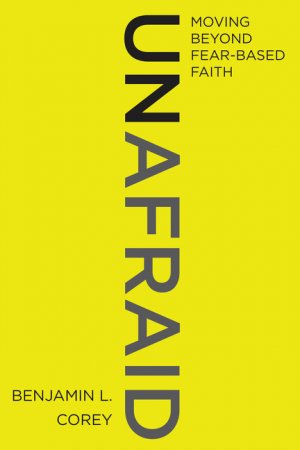
This fall, when I began reading Benjamin Corey’s excellent new book Unafraid: Moving Beyond Fear-Based Faith, my home state was burning. Forest fires were swiftly destroying parts of the iconic Columbia Gorge in Oregon, the ash floating westward to cover my car, over 50 miles away. Smoke clouded our skies for over a week, and breathing outside made my throat sore and my head throb. At the same time, Hurricanes Maria and Harvey were ravishing parts of Texas, Florida, and Puerto Rico; Mexico City experienced an epic earthquake; floods killed scores in Southeast Asia.
It felt like the apocalypse, like the world was hurtling toward destruction, and that we should all be afraid—very afraid—of God’s final judgment on us.
Thank goodness I long ago abandoned a fear-based faith, similar to the one Corey deconstructs in Unafraid. Had I not, the confluence of so many natural disasters might portend some Armageddon over which we have no control, leading to what Corey describes as an “either overtly or passively destructive behavior.” If the earth is to be destroyed anyway before God calls us to heaven, by natural disasters sent to us by God, why bother doing anything to redeem and beautify the world we now live in?
To others, these events in September reflected the awful ramifications of climate change, something we should fear, for sure, but which might inspire us to create a better, healthier earth. According to Corey, we can dream of this world—and act on our dreams—but only if we are willing to relinquish an eschatological view that has been glorified in Christian movies and books and songs, that has been the cornerstone of evangelical thought, and that says we don’t really have to follow the “on earth as it is in heaven” mandate Jesus talks about, because all believers will be headed for heaven soon, anyway.
American evangelicals’ tight-fisted grip of fear-based theology has divided Christians from each other, as they create boundaries that dictate who is to be loved and who is to be feared.
This is one of many significant claims Corey makes in Unafraid. According to Corey, American evangelicals’ tight-fisted grip of fear-based theology has divided Christians from each other, as they create boundaries that dictate who is to be loved and who is to be feared; but such a theology also contradicts the Gospels, where the model of Jesus’ ministry and his perfect love for others casts out fear (I John 4:18). Corey’s book convincingly shows that those who are captive to a fear-based theology and caught in a trap of “right thinking or right doing” miss out on the chance to live and love deeply.
Corey begins Unafraid by narrating what he terms a “spiritual mid-life crisis,” one in which everything he’d been taught about faith—about God, the Bible, Jesus, those with whom he disagreed—began to crumble. The initiating incident for this crisis was the execution of a Jordanian pilot by ISIS, which raised all kinds of questions for Corey about the essential character of God: If the pilot, who was Muslim, would face God’s judgment and a fiery afterlife in hell, how was God any better than ISIS? Was God really just another terrorist, wanting followers to accept his laws by threatening hellfire and damnation? How did this image of a wrath-filled God reconcile with the idea that God is love?
Is God really just another terrorist, wanting followers to accept his laws by threatening hellfire and damnation?
Unafraid compellingly explores Corey’s answers to these questions, tracing the journey his spiritual crisis inspires him to take, away from the belief system he’d long embraced to one that is more expansive, more inclusive, more freeing. Corey examines the evangelical claim that God is all-loving and yet vindictive, a deity who loves us so much he is willing to make his son suffer and die because we are horrible people, beset by sin and wrongful living. Such a belief system suggests we must be driven by right living, else God will smack us down, on earth and for all eternity.
Like Corey, I felt the oppression of this belief, certain that one betrayal of God—a few too many beers (or even, one alcoholic drink); a curse word or two; petty spite toward my parents—would cause me unimaginable suffering. God was just waiting for me to mess up so he could teach me a lesson. This fear of divine retribution, Corey argues, does not lead to freedom but to oppression, the opposite of what Jesus offers us as good news in the gospels.
In chapter after chapter, Corey returns to the premise that a fear-based faith is anathema to the Bible and the character of God revealed there, showing that the evangelical understanding of God is fundamentally wrong and that it leads to a distorted view of ourselves and others. Rather than seeing everyone as a precious image-bearer of the Divine, we learn to believe that we are the sum total of our horrific sins, some more horrific than others, and that we are thus unlovable. But if we truly bear the image of God, and if God is love, our true essence is also love. After hearing the messages about our unworthiness from everywhere—including, most significantly, the church—it is hard for us to accept that we are worthy of love. In fact, Corey claims, “it is easier to believe that God is love and completely loving than it is to actually embrace the belief that we are lovable.”
Unafraid uses the same mix of personal narrative and thoughtful inquiry that readers of Corey’s blog, hosted on Patheos, have come to expect. Although he is dealing with difficult ideas, including theodicy and orthopraxy, among others, Corey’s voice is entirely accessible to those who, like me, have no training—or really, no interest—in formal theological studies. Corey has two seminary degrees from Gordon-Conwell and a doctorate in intercultural studies from Fuller Theological Seminary, yet he turns to his own stories as a means of conveying important truths. Refreshingly, his work is far from a dense slog to endure, and is instead a narrative-based exploration that both challenges and inspires.
Although my own spiritual crisis occurred long before mid-life, I could resonate with Corey’s journey, away from fear-based faith to a faith that feels richer, deeper, and more aligned with what I know of God and God’s love. Corey encourages me to continue walking confidently away from fear (and shame, and limitation) and toward Jesus—who is, according to Corey, “the ultimate expression of love.” Unafraid is an unabashed invitation to join Corey on this journey in “the direction of love,” a journey he claims we are already on, if only we denounce the fear that too often keeps the path hidden.
Melanie Springer Mock is a Professor of English at George Fox University, Newberg, Oregon. She is also the author or co-author of four books including, most recently, If Eve Only Knew: Freeing Yourself from Biblical Womanhood and Becoming All God Means for You to Be (Chalice Press, 2015); a fifth book is forthcoming from Herald Press. Her essays and reviews have appeared in The Nation, Christianity Today, The Chronicle of Higher Education, and Mennonite World Review, among other places.


